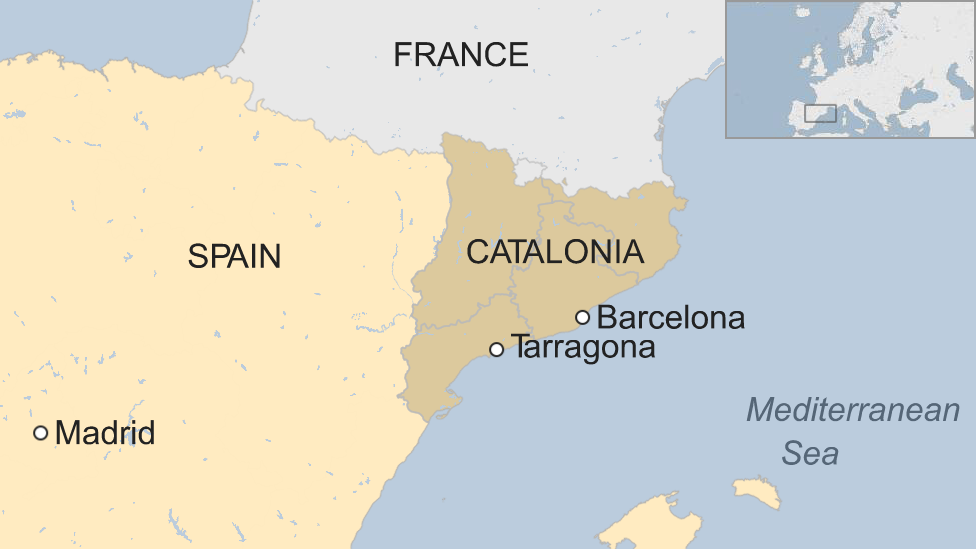Catalan independence debate gets personal ahead of Spain vote
- Published
Why these are not your average regional elections
"Spaniards hate us," said Ramon Passolas, with a rifle on his shoulder.
He marched with pride through the narrow cobbled streets of central Barcelona's Gotico neighbourhood, as the red, yellow and blue Catalan pro-independence flags fluttered in the wind.
"War! War! War!" shouted his commander.
This was a re-enactment of events in the 18th Century, but Ramon feels like he is part of an historic struggle in 2015.
"The Spaniards hate us because we're different," he told me.
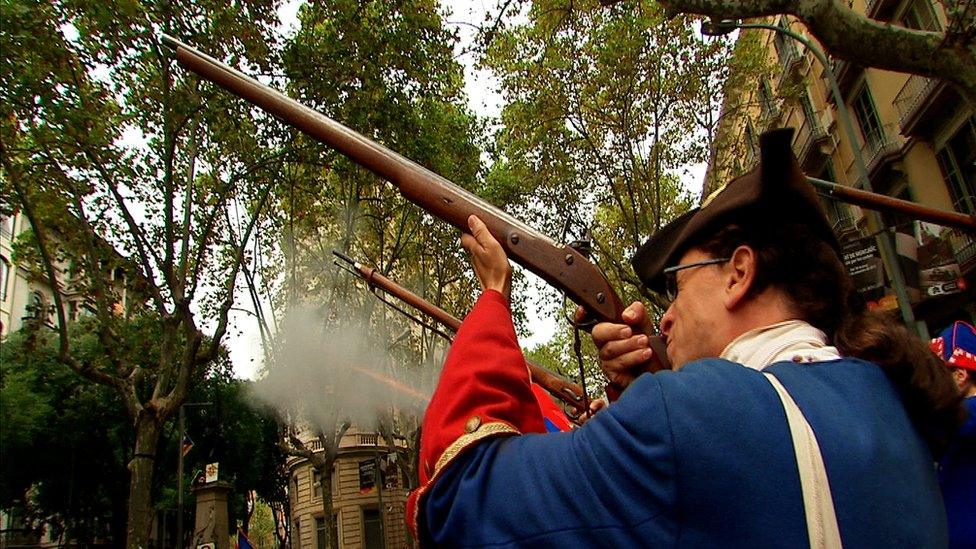
The struggle for independence in Catalonia is wrapped up in a long and sometimes violent history
"Really?!" I said, as I began to explain that I knew plenty of people in Madrid who definitely did not think that way.
"I don't mean each one of them," replied Ramon.
"Maybe 60 or 70%. You ask them what they think of the Catalans, they'll tell you they're scum, they're pigs."
Perceived grievances
Such language borders on the extreme, and does not reflect reality.
But perceptions speak volumes when political tension runs high.
And on Catalonia's national day, which was - by no coincidence - also the first day of campaigning ahead of this weekend's crucial regional elections, we met others who had similar thoughts.
"Spain doesn't like us," 15-year-old Julia told me.
"The Spanish government is not friendly with Catalonia," said Eloy, who was born in Galicia, but grew up in Catalonia.
In reality, most of the animosity of the Catalan pro-independence movement is directed at Spain's conservative Popular Party government.
In the words of Francisco Camas Garcia, an analyst at Metroscopia, one of Spain's leading polling companies, "no-one can deny that there is a feeling in Catalonia that they [the Catalans] have been mistreated by the Spanish government".
'Blackmailing Spain'
In private, the Spanish government admits that mistakes have been made over the handling of the Catalan question.
Namely in 2012, when the former Spanish Education Minister, Jose Ignacio Wert, suggested that his department's aim was to make Catalan school children "more Spanish".
Catalonia independence debate divides friends
But the government of Prime Minister Mariano Rajoy accuses the Catalan authorities of manipulating public opinion and fuelling animosity between Catalonia and the rest of Spain.
It says regional officials have attempted to blackmail Spain into accepting a referendum by threatening a unilateral declaration of independence and attempting to turn this Sunday's regional election into a vote on whether or not Catalonia should break away from Spain.
Madrid, and more accurately people on the right of Spanish politics, are worried.
According to the opinion polls, the majority of Catalans want a referendum.

Why do these elections matter?
Catalonia's governing Convergencia party says the vote is a de-facto referendum on independence from Spain.
It has joined forces with the second biggest political party in Catalonia, Esquerra Republicana, to create a single list of candidates, under the banner Together for Yes.
They argue they have been forced to do this because the Spanish government has consistently refused to allow a legally recognised referendum.
What are the possible outcomes?
Together for Yes says that if it - together with the far-left pro-independence party Candidatures d'Unitat Popular - wins a majority in the Catalan parliament (68 out of 135 seats), then it will have a "democratic mandate" to start a process to create an independent Catalonia.
If Together for Yes fails to gain a majority then it would be tantamount to a serious defeat for the pro-independence movement.
Would a victory for Together for Yes definitely lead to an independent Catalonia?
If Together for Yes wins, as polls suggest it will, it plans to start a transitional period lasting up to 18 months, which in theory would lead to a unilateral declaration of independence.
The Spanish government says it will use the country's constitutional court, and other legal means, to block the creation of an "illegitimate" Catalan state.

But according to Francisco Camas Garcia of Metroscopia, only about 20% of Catalans support the idea of a unilateral declaration of independence.
So Catalans find themselves victims of a political version of cat and mouse.
By refusing point-blank to even enter into negotiations on the possibility of a referendum on independence, Mr Rajoy hopes the Catalan secessionist movement will run out of momentum.
But the Catalan government says it can use Sunday's election as a vote on independence and will press on regardless of whether Mr Rajoy agrees.
The game
Ultimately Artur Mas, the head of Catalonia's regional government, wants to pressurise Madrid into agreeing to a legal referendum.
"That's the game," proclaimed Guillermo Sanchez, who had his face painted with the thin red and yellow stripes of the Catalan flag at a pro-independence demonstration at the start of the election campaign.
This pro-independence supporter is optimistic that, in the end, the Spanish government will have to sit down and negotiate over a referendum.
However Mr Mas said only this week that he was "sceptical" that would happen.
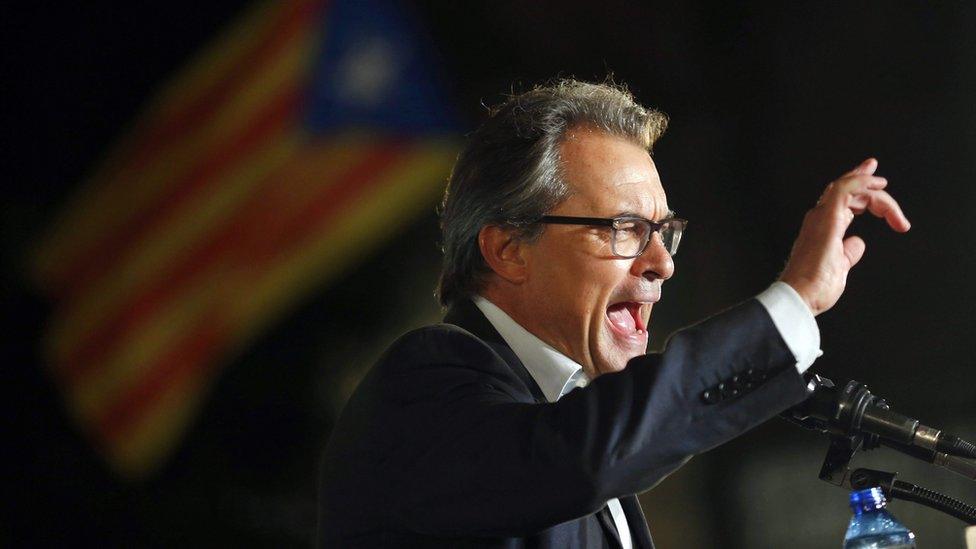
Catalan leader Artur Mas wants to pressure Madrid into agreeing to a legal referendum
Some, like flower-shop owner Nieves Sabadell in the town of Hospitalet, which borders Barcelona, believe there are "much more important issues" than independence.
"If half of people have lost their homes, don't have jobs and can't feed their children, they [the politicians] should worry about this."
But even if opinion remains fairly divided over the pros and cons of independence, what the Catalan authorities have successfully cultivated amongst many Catalans is a grievance that they have been denied the right to vote.
Some Spanish politicians, like the new left-wing Podemos leader Pablo Iglesias, oppose Catalan independence but support the idea of a referendum.
For now, Catalans will vote on Sunday.
If the pro-independence parties win a majority of seats in the Catalan parliament, which most opinion polls predict they will, it will be a step into the unknown.
A constitutional crisis is brewing in Spain.
- Published11 September 2015
- Published10 November 2014
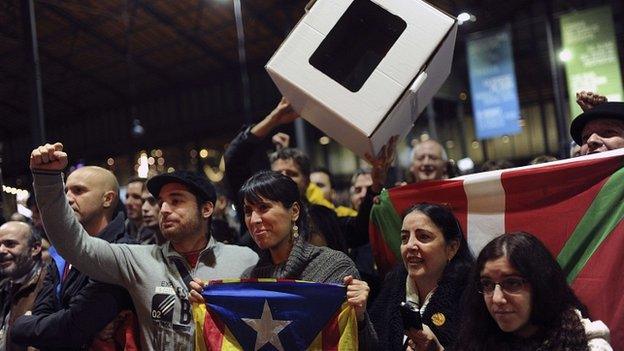
- Published18 October 2019
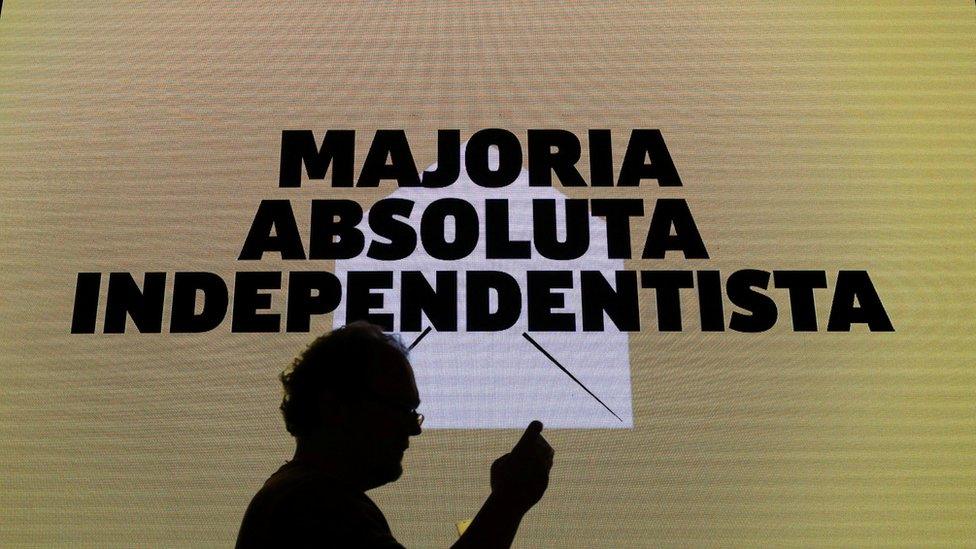
- Published21 August 2023
